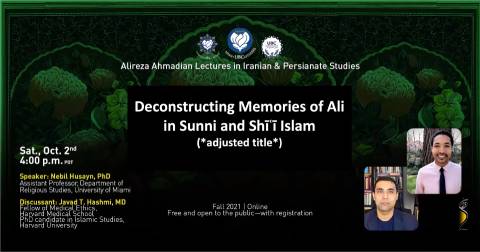*The event title was later adjusted to “Deconstructing Memories of Ali in Sunni and Shīʿī Islam” as per the speaker’s request.


Poster design by Farzan Kermani
تأملاتی در داستان علی در اسلام اهل سنت
سخنران: دکتر نِبیل حسین، استادیار گروه مطالعات دینی، دانشگاه میامی
طرفبحث: دکتر جواد هاشمی، پژوهشگر اخلاق پزشکی، دانشکده پزشکی هاروارد، دانشجوی دکتری مطالعات اسلامی، دانشگاه هاروارد
علی، چهارمین خلیفهٔ اسلام را می توان یکی از مورداحترامترین شخصیتهای تاریخ اسلام دانست. تصویر تقریباً یدکدستی که از علی بهعنوان شخصیتی باتقوا در ادبیات مسلمانان وجود دارد بهنحوی است که روند بازسازی شخصیت او طی قرنها پنهان میماند. برای سالیان دراز، عدهای از مسلمانان علی را دوست نداشتند و او را حاکمی نامشروع میدانستند. نبیل حسین در کتاب جدید خود با عنوان «مخالفت با امام» به شیوههای گوناگونی که مسلمانانِ نخستین از علی یاد میکردند، توجه میکند و زمینههای شکلگیری تسنن و تشیع را بررسی میکند. در این ارائه، یافتههای کلیدی این کتاب مورد بحث و بررسی قرار میگیرد.
The event recording is now available:
Presented in English.
Islam’s fourth caliph, Ali, can be considered one of the most revered figures in Islamic history. His nearly universal portrayal in Muslim literature as a pious authority obscures a centuries-long process that entailed the rehabilitation of his character. For many years, some Muslims disliked Ali and considered him an illegitimate ruler. In his new book, Opposing the Imam, Nebil Husayn considers the diverse ways in which early Muslims remembered Ali and contextualizes the rise of both Sunnism and Shi’ism. This presentation discusses key findings from this recent publication.
Guest Speaker:
Nebil Husayn teaches in the Department of Religious Studies at the University of Miami. His research explores authoritarianism in the Middle East, debates on the caliphate, and the development of Islamic thought. Husayn began his work as an undergraduate at the University of Virginia, where he studied Arabic, Persian, Islamic history and Muslim cultures before pursuing study abroad in Syria and Yemen for four years. During his time abroad, he pursued a seminary education with traditionally-trained Sunni and Shiʿi scholars. Husayn returned to the United States to obtain an M.A. in Arabic and Islamic Studies from Harvard University and a Ph.D. in Near Eastern Studies from Princeton University. He is the recipient of a Fulbright award and the University of Miami Fellowship in the Arts and Humanities. The family of the Prophet Muhammad, Ali b. Abi Talib, and their descendants (known as Alids) occupy a central place in his research. Husayn’s first book, Opposing the Imam (2021), published with Cambridge University Press, examines the history of early Muslims who were hostile to Islam’s fourth caliph, Ali, and his descendants. Husayn aims to continue interrogating the intellectual and political histories of the Alid family in his future work.
Discussant:
Javad T. Hashmi is a board-certified emergency physician, fmr. Fellow of Medical Ethics at Harvard Medical School, and a PhD candidate in the Study of Religion (Islamic Studies) at Harvard University. In addition to his medical training, Dr. Hashmi holds a bachelor’s and master’s degree in Arabic & Islamic Studies from U.C. Berkeley and Harvard respectively.
Should you have any questions, please contact the Department of Asian Studies at Asian.Studies@ubc.ca.